Related Research Articles

The jute trade is centered mainly around India's West Bengal and Assam, and Bangladesh. The major producing country of jute is India and biggest exporter is Bangladesh, due to their natural fertile soil. Production of jute by India and Bangladesh are respectively 1.968 million ton and 1.349 million metric ton. Bengal jute was exported to South East Asia from the 17th century by the Dutch, French and later by other Europeans.

Jaranwala is a city and capital of Jaranwala Tehsil located in the Faisalabad District of Punjab, Pakistan. It is the 58th largest city of Pakistan.
A jute mill is a factory for processing jute. There is evidence of jute fibre extraction dating back to the Han dynasty, with a fragment of jute paper being discovered in Dunhuang, in the Gansu Province. The first known mechanical jute mills are believed to have been converted Flax mills, the oldest possibly being establish in Dundee, after a contract was agreed with the East India Company, for the supply of jute as a substitute for then scarce flax, in 1820. By the mid-1800s jute mills were being established in British India, George Acland's Mill of 1855, at Rishra, being the oldest. The world's largest jute mill was the Adamjee Jute Mills at Narayanganj in Bangladesh, which closed all operations in 2002.
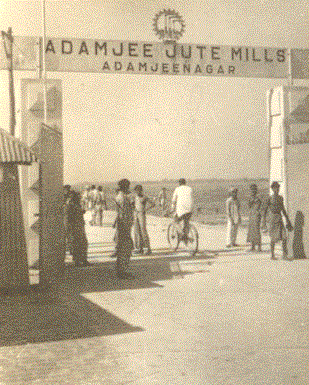
Adamjee Jute Mill was a jute mill in Bangladesh. It was established in Narayanganj in 1950 by the Adamjee Group. It was the second jute mill in East Pakistan after Bawa Jute Mill which was the first Jute Mill in East Pakistan. Gradually, the mill became the largest jute mill in the world, exceeding the jute mills of Calcutta, India, and Dundee, Scotland. The mills were nationalised after the independence of Bangladesh in 1972. It was operated by the Bangladesh Jute Mills Corporation before being closed down in 2002.

Mirza Ahmad Ispahani (1898–1986) was a Perso-Bengali businessman based in Chittagong and the patriarch of the Ispahani family. He was the founder of Orient Airways and the first chairman of Pakistan International Airlines (PIA). He was the chairman of Ispahani Group.
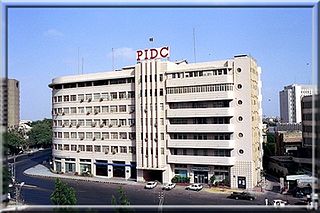
Pakistan Industrial Development Corporation (PIDC) is a state corporation of Pakistan working under Ministry of Industries and Production.
The Saigol Group, also known as Kohinoor Group, is a Pakistani group of companies headquartered in Lahore. It was founded by Amin Saigol in the 1930s with a small shop that eventually developed into the Kohinoor Rubber Works.
Transcom Limited is a Bangladeshi business conglomerate. The businesses under this group include beverage, pharmaceuticals, newspaper, radio channel, electronics, foods, etc. Transcom is the local agent or comprador of international brands. This group employs more than 10,000 people. Transcom Group is one of the oldest and biggest companies in Bangladesh. Their operation in Bangladesh initially started in 1985 as a tea plantation company.
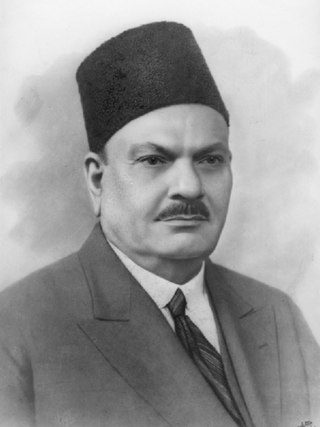
Sir Adamjee Haji Dawood Bawany was a Pakistani businessman and philanthropist who founded Adamjee Group. He was also an activist in the Pakistan Movement.
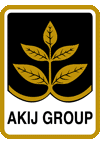
Akij Group is one of the largest Bangladeshi industrial conglomerates. The industries under this conglomerate include textiles, tobacco, food and beverage, cement, ceramics, printing and packaging, pharmaceuticals, consumer products etc. In 2009, Akij Group paid 390 million euros in tax, making it the biggest local tax-payer, contributing two per cent to the nation's entire budget. Akij also provides services in healthcare, information and communication technology. Its turnover in 2009 was 89 billion taka. In 2018, Akij sold their tobacco division to JTI for $1.47 billion. It was the biggest ever single foreign direct investment in Bangladesh.

Partex Group is one of the largest family-run conglomerates in Bangladesh, consisting of over 70 factories. The industries under this conglomerate include foods and beverages, steel, real estate, furniture, agribusiness, plastics, etc.
A K Khan & Co. Ltd. is one of the oldest Bangladeshi conglomerates headquartered in Chittagong. It was established in 1945 by Abul Kashem Khan during the Second World War.

Army Welfare Trust (AWT), (Urdu: آرمی ویلفیر ٹرسٹ) also known as Askari Group, is a Pakistani conglomerate based in Rawalpindi.

The Port of Narayanganj is a river port in Narayanganj, Bangladesh. It is one of the oldest and busiest river ports in Bangladesh; and one of the major ports of the Bengal delta. The port is located on the Shitalakshya River. The port area is home to numerous industries.
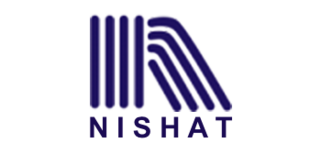
Nishat Group is a group of companies headquartered in Lahore, Pakistan. The company was founded by Pakistani business magnate Mian Muhammad Yahya in 1951. Mian Muhammad Mansha is the current chairman of the group.
Abdul Wahid Adamjee was a Pakistani industrialist.
The jute industry is a historically and culturally important industry in Bangladesh dating back to during the growth of the East India Company in the Indian subcontinent. Despite once being one of the country's biggest industries and major export items, the jute industry has declined since the 1970s. Exports have fallen as other countries grow jute independently, decreasing the demand for jute to be exported, and other products like plastics and hemp find more widespread use.
Bibojee Group, also known as Ghandhara Group, is a group of companies headquartered in Karachi. It is among the major enterprises in Pakistan, incorporating businesses in manufacturing – textiles, automotive vehicles, tyres, insurance, and construction industries.
Anwar Group of Industries is one of the largest and oldest Bangladeshi conglomerates. It consists of 18 subsidiaries that are servicing consumer goods, steels, cement, textile, finance and automotive industry. Manwar Hossain is the Chairman of Anwar Group.
References
- ↑ Hussain, Dilawar (9 December 2007). "People who own greatest amount of wealth".
- ↑ "Rober Barons".
- 1 2 "Pakistan: The Jute King". TIME. December 4, 1964.
- ↑ "Great fortunes do not see third generation". 14 June 2004.
- ↑ "Adamjee Group of Companies". www.adamjees.com. Retrieved 2018-06-03.
- ↑ "Adamjee Group of Companies". www.adamjees.com. Retrieved 2018-06-03.
- ↑ "Adamjee Group of Companies". www.adamjees.com. Retrieved 2018-06-03.
- ↑ "Adamjee Group of Companies". www.adamjees.com. Retrieved 2018-06-03.
- ↑ "Adamjee Group of Companies". www.adamjees.com. Retrieved 2018-06-03.
- ↑ "Adamjee Group of Companies". www.adamjees.com. Retrieved 2018-06-03.
- ↑ "Adamjee Group of Companies". www.adamjees.com. Retrieved 2018-06-03.
- ↑ "Adamjee Group of Companies". www.adamjees.com. Retrieved 2018-06-03.
- ↑ "Adamjee Engineering". www.adamjee-engg.com. Retrieved 2018-06-03.
- ↑ "Adamjee Group of Companies". www.adamjees.com. Retrieved 2018-06-03.
- ↑ "Adamjee Group of Companies". www.adamjees.com. Retrieved 2018-06-03.
- ↑ "Adamjee Group of Companies". www.adamjees.com. Retrieved 2018-06-03.
- ↑ "Adamjee Group of Companies". www.adamjees.com. Retrieved 2018-06-03.
- ↑ "Adamjee Group of Companies". www.adamjees.com. Retrieved 2018-06-03.
- ↑ "Adamjee Group of Companies". www.adamjees.com. Retrieved 2018-06-03.
- ↑ "Adamjee Group of Companies". www.adamjees.com. Retrieved 2018-06-03.
- ↑ "Local News on Bangladesh". www.sdnbd.org. Retrieved 2020-05-24.
- 1 2 "Adamjee Group of Companies". www.adamjees.com. Retrieved 2018-06-03.
- ↑ "Local News on Bangladesh". www.sdnbd.org. Retrieved 2020-07-15.
- ↑ "Abdul W. Adamjee, Pakistani Magnate, Millionaire, Is Dead". The New York Times. 1972-07-05. ISSN 0362-4331 . Retrieved 2020-05-24.
- ↑ "Dhaka Tobacco Industries - Tongi Tobacco Processing Plant". www.industryabout.com. Retrieved 2020-05-23.
- ↑ "HOME | Partex Star Group Corporate" . Retrieved 2020-05-23.
- ↑ "Adamjee Group of Companies". adamjees.com. Retrieved 2020-06-28.
- ↑ "Mansha group takes over AIC". DAWN.COM. 2004-05-30. Retrieved 2020-05-23.
- ↑ https://www.dawn.com/news/887488/when-fortune-stops-smiling-on-someone [ bare URL ]
- ↑ https://www.dawn.com/news/1402847 [ bare URL ]
- ↑ https://www.dawn.com/news/1690529 [ bare URL ]